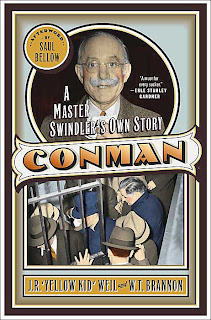 Joseph Weil was once considered the quintessential American con man; I've not kept up to date with the scholarly study of confidence games, so I can't say whether he's been lapped by some more recent trickster. But in his heyday -- roughly 1895 to 1945 -- he was the king of the swindlers, raking in an estimated eight million dollars during his career bilking the rich and gullible.
Joseph Weil was once considered the quintessential American con man; I've not kept up to date with the scholarly study of confidence games, so I can't say whether he's been lapped by some more recent trickster. But in his heyday -- roughly 1895 to 1945 -- he was the king of the swindlers, raking in an estimated eight million dollars during his career bilking the rich and gullible.Con Man is his professional autobiography, originally published in 1948 and co-written by the novelist and journalist W.T. Brannon. ("Co-written" may be the usual exaggeration; Con Man is in Weil's voice, but that doesn't mean he did anything more than talk while Brannon took notes or ran a tape recorder.) Weil was old and out of the con game at that point -- he was born in 1875 -- but he lived for quite a while afterward, in quiet, law-abiding retirement (or so he said), only dying in 1976 at the age of a hundred.
This is a breezy book, full of colorful names and intricate schemes -- most of them connected with racehorses in one way or another -- but notably light on dates and sequence. It seems to be weighted most heavily towards the early years of Weil's career, before he went to jail for the first time -- say, up until the Great War. It's a pleasant book, but won't be of much direct use to rubes these days; long cons may always be similar in structure, but they're very different in set-up and execution in the 21st century. (And the legal atmosphere, as Weil mentions several times, was vastly different by the time he wrote the book -- bilking a rich Chicagoan around the turn of the last century wasn't even illegal in most cases, since only a bumpkin from the sticks was expected to be dumb enough to fall for such things, and so only the bumpkin had to be protected.) It's heavily anecdotal, as Weil runs through one scheme after another, in a series that the reader assumes is chronological without much evidence. Weil isn't particularly bragging in Con Man -- he's telling stories, in the fine old American style -- but of course he comes out well in nearly all of his stories. (He does tend to skim on the details of the times he was sent up the river.)
Con Man was published as part of a short series called the Broadway Library of Larceny, which comprised at least five books (all reprints, as far as I know) in around 2005 curated and edited by Luc Sante. Sante also dug up a profile piece on Weil from 1956 from The Reporter to serve as an Afterword to this edition, which would be of only mild interest except for the fact that it was written by Saul Bellow.
I've got two of the other Library of Larceny books buried in my to-read stacks -- I can't say that Con Man makes me eager to dive right into them, but it was an pleasant, if lightweight, look at a time and a society that are now long gone.
No comments:
Post a Comment